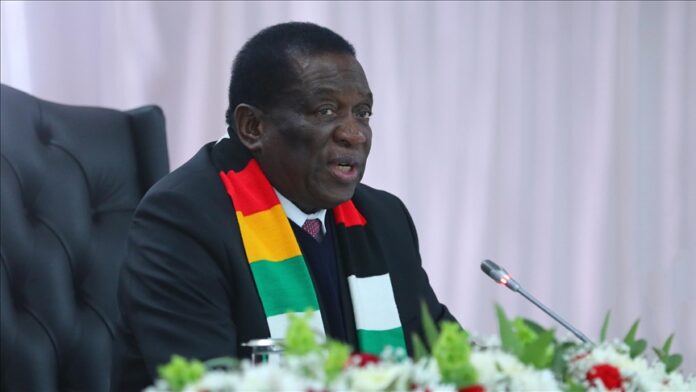In a move aimed at fostering improved trade relations, Zimbabwe’s President Emmerson Mnangagwa announced the suspension of all tariffs on American imports. The decision, announced in early April 2025, comes in response to the 18% tariff imposed on Zimbabwean exports by the United States under the leadership of former President Donald Trump’s administration.
The Zimbabwean government’s move to suspend these tariffs is part of a broader strategy to build stronger bilateral ties with the United States and create a more equitable trade environment for both nations. The suspension aims to open up the Zimbabwean market to American goods while simultaneously encouraging the growth of Zimbabwean exports to the U.S.
The backdrop to Zimbabwe’s tariff suspension stems from a move by the Trump administration in early 2025, which placed an 18% tariff on goods imported from Zimbabwe. The tariff was introduced as part of the U.S. government’s strategy to protect domestic industries and jobs, a practice known as “reciprocal tariffs.” These tariffs are typically designed to apply pressure on foreign countries to remove or reduce their own trade barriers, thus benefiting American businesses and workers.
For Zimbabwe, the impact of this tariff was significant, as the country relies heavily on its exports to sustain its economy. Zimbabwe’s primary exports to the U.S. include agricultural products, tobacco, and minerals, among others. The 18% tariff threatened to reduce the competitiveness of these products in the U.S. market, leading to potential losses for Zimbabwean businesses and workers.
In response, President Mnangagwa decided to take proactive steps toward mending trade relations between Zimbabwe and the United States. The suspension of all tariffs on American goods is a clear indication of Zimbabwe’s desire to maintain cordial diplomatic ties with the U.S., particularly under the Trump administration. The Zimbabwean leader emphasized that the country seeks to build mutually beneficial relationships with all nations, without engaging in adversarial trade practices.
“The principle of reciprocal tariffs, as a tool for safeguarding domestic employment and industrial sectors, holds merit,” Mnangagwa said in his statement. “However, the Republic of Zimbabwe maintains a policy of fostering amicable relations with all nations, and cultivating adversarial relationships with none.”
By suspending tariffs, Zimbabwe aims to encourage more American imports, which could potentially benefit local consumers by diversifying the range of goods available in the market. At the same time, the suspension of tariffs is intended to boost the competitiveness of Zimbabwean products in the U.S. market. The hope is that this move will result in increased exports from Zimbabwe to the U.S., helping to stimulate the country’s economy and create job opportunities.
In his statement, Mnangagwa underscored that Zimbabwe’s decision to suspend tariffs was rooted in a desire to strengthen trade relations and enhance cooperation between the two countries. He expressed confidence that this measure would facilitate the growth of both Zimbabwean exports to the U.S. and American imports to Zimbabwe.
“Our commitment to a framework of equitable trade and enhanced bilateral cooperation is what drives this decision,” he explained. “This action underscores our dedication to promoting a positive and constructive relationship with the United States.”
The suspension of tariffs on American goods is seen as a strategic move in Zimbabwe’s broader efforts to revive its economy. The country has long struggled with economic challenges, including hyperinflation, a shrinking industrial sector, and widespread poverty. As part of his administration’s economic agenda, President Mnangagwa has been focused on attracting foreign investment, improving the business climate, and boosting trade.
The U.S. is an important trade partner for Zimbabwe, and improving relations with Washington could help the country access vital markets for its exports, as well as attract investments in various sectors, including agriculture, mining, and manufacturing. By removing trade barriers and promoting cooperation, Zimbabwe hopes to create a more conducive environment for economic growth and development.
The decision to suspend tariffs has been met with cautious optimism from both domestic and international observers. Zimbabwe’s move has been praised as a positive step towards better relations with the United States, especially considering the difficult history between the two countries. Over the years, Zimbabwe has faced criticism from the U.S. over issues such as human rights, democracy, and governance. However, Mnangagwa’s recent actions reflect a shift towards prioritizing economic diplomacy and fostering peaceful, constructive relationships with international partners.
Trade analysts have suggested that Zimbabwe’s decision could also serve as a model for other countries facing similar challenges with tariffs and trade disputes. By suspending tariffs, Zimbabwe is demonstrating a willingness to negotiate and find common ground with its trading partners, rather than engaging in tit-for-tat retaliations that could harm both economies.
While Zimbabwe’s decision to suspend tariffs is a step in the right direction, the full impact of this policy change will depend on how both countries proceed with their trade relationships. The U.S. has not yet responded to Zimbabwe’s tariff suspension, and it remains to be seen whether the U.S. government will reciprocate by reducing or eliminating the 18% tariff on Zimbabwean imports.
For Zimbabwe, this move presents an opportunity to engage with the U.S. in a way that could lead to more favorable trade terms. By making the first move, Zimbabwe has shown that it is serious about improving relations and building a more prosperous future for its citizens. However, the country must also focus on addressing internal economic challenges, such as inflation, unemployment, and infrastructure development, in order to fully capitalize on the potential benefits of this new trade approach.
In the meantime, the suspension of tariffs is expected to have positive short-term effects on Zimbabwean consumers, who will have access to a wider range of American goods at lower prices. It could also provide a boost to Zimbabwe’s agricultural and industrial sectors, which are eager to see more exports reach the U.S. market.

